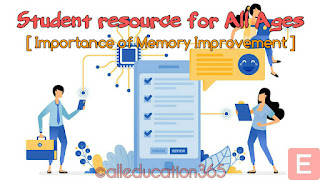The Importance of Memory Improvement for Students of All Ages
Memory Improvement for Students of All Ages
Memory plays a crucial role in a student's academic and personal life. It is a critical aspect of learning, retaining information, and recalling it when required. Memory improvement is essential for students of all ages, as it helps them perform better in school, score higher grades, and improve their overall quality of life. In this article, we will discuss the importance of memory improvement for students and how it can be enhanced.
What is Memory and How Does it Work?
Memory refers to the cognitive process of encoding, storing, and retrieving information. The process of memory begins with encoding, where the information is transformed into a form that can be stored in the brain. This information is then stored in various regions of the brain and can be retrieved when needed.
The Different Types of Memory
There are several different types of memory, each with its unique characteristics and functions. The three main types of memory are:
- Sensory Memory: This type of memory is brief and lasts for a fraction of a second. It refers to the initial perception of sensory information.
- Short-term Memory: Short-term memory is also known as working memory and is used to store information temporarily. This type of memory can last for several seconds to a minute.
- Long-term Memory: Long-term memory refers to the permanent storage of information in the brain. This type of memory can last for a lifetime.
The Importance of Memory for Students
Memory plays an essential role in a student's academic and personal life. Here are some reasons why memory improvement is crucial for students:
- Better Learning: Memory improvement helps students retain information better, making it easier for them to learn new concepts and retain them for longer periods.
- Improved Test Scores: Students who have a better memory tend to perform better on exams, as they are able to recall information more easily. This can lead to higher test scores and a better academic record.
- Better Time Management: Memory improvement can also help students better manage their time. When students can recall information more easily, they can study faster and use their time more effectively.
- Improved Confidence: Students who have a good memory tend to feel more confident in their abilities. This can lead to a positive self-image and a more positive outlook on life.
- Better problem-solving skills: Memory improvement can also enhance a student's problem-solving skills. By retaining information, students can recall it when needed, allowing them to think more critically and solve problems more effectively.
Ways to Improve Memory
Here are some tips and strategies that can help students improve their memory:
- Exercise: Exercise is one of the most effective ways to improve memory. Regular physical activity has been shown to increase blood flow to the brain, which can enhance memory and cognitive function.
- Sleep: Getting enough sleep is also critical for memory improvement. Sleep helps the brain consolidate and process information, making it easier to recall it when needed.
- Nutrition: A healthy diet rich in nutrients and antioxidants can also improve memory. Foods that are high in omega-3 fatty acids, such as fish, have been shown to have a positive effect on memory.
- Mental Stimulation: Keeping the brain active and engaged can also improve memory. This can be done by reading, solving puzzles, or engaging in other mentally stimulating activities.
- Repetition: Repetition is an effective method for improving memory. By repeating information, students can strengthen the connections between neurons in the brain, making it easier to recall the information when needed.
- Organization: Organizing information can also improve memory. By grouping similar information together, students can make it easier to recall and remember. This can be done by creating mental associations, using mnemonic devices, or creating visual aids such as mind maps.
- Relaxation: Relaxation techniques such as meditation and deep breathing can also improve memory. These techniques can reduce stress and improve the overall functioning of the brain, making it easier to retain and recall information.
- Active Learning: Active learning, where students engage in hands-on activities and actively process information, can also improve memory. This can be done by taking notes, summarizing information, or teaching the information to someone else.
- Attention: Paying attention to the information being presented can also improve memory. By focusing and paying attention, students can encode the information more effectively and make it easier to recall.
Conclusion
Memory plays a crucial role in a student's academic and personal life. Memory improvement is essential for students of all ages, as it helps them perform better in school, score higher grades, and improve their overall quality of life. By incorporating memory improvement strategies into their daily routines, students can enhance their memory and achieve their full potential.
